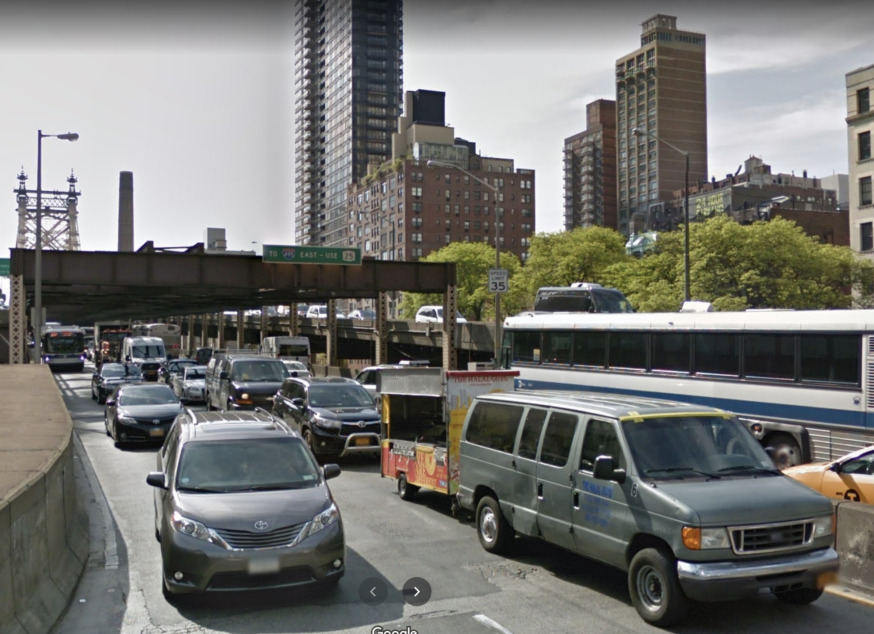
Traffic heading into Manhattan from the Queensboro Bridge (Google Maps)
July 14, 2020 By Allie Griffin
The MTA’s congestion pricing plan that will toll cars in busy areas in Manhattan will be delayed “roughly a year” due to a federal hold-up, an agency official announced Monday.
MTA Chief Development Officer Janno Lieber said congestion pricing — which will charge drivers a fee to enter Manhattan below 60th Street — will be held back because the Trump administration has tied the initiative up in bureaucracy.
“We’ve literally hired the consultants. We’ve designed the systems and the cameras and so on that are going to be implemented, but we just can’t move forward without the Trump Administration’s action,” Lieber said in a video interview with the Manhattan Institute.
The new tolls were slated to go into effect in January 2021.
The MTA must complete a federal environmental review process for the project to move ahead, but the Trump administration has yet to initiate the process or detail what is needed with it, Lieber said.
Lieber said that attempts to contact federal officials to begin the process have largely been ignored.
The Tri-State Transportation Campaign (TSTC), a transit advocacy group, argues that the congestion pricing plan has been “intentionally held up” by the Trump administration.
“It is a tremendous blow to the MTA and to the New York City region, which relies on our public transit network to exist,” the advocacy organization said in a statement.
“It’s now even more clear that the best interest of New York City’s public health and economy is not a priority for the White House, and now millions of commuters will suffer unnecessarily as a result,” TSTC added.
The plan was approved by the state legislature in March 2019. However, the price of congestion tolls has yet to be determined.
10 Comments

We already pay extra in Sales Tax, Payroll/Income Tax, along with other surcharges, taxes and fees – some of which are little known for some of us. And that’s on top of fares, tolls and other fees for (or related to) service.
I, for one, am glad that “federal bureaucracy” has tied up what would ultimately amount to theft under color of law.
Where do we draw the line for a “public-benefit corporation” that is increasingly seeing fit to benefitting from the public for its continued miserable existence? The same corporation that’s fine with continuous overall cuts on service and saddling us with insane bills with little to show for it (e.g.: overly inflated construction and maintenance bills for shoddy work that requires additional work to correct in a short timeframe).
Well, that’s one more year I can afford to work in the city.
Good !
Too bad it isn’t happening sooner, it will be a great thing for the neighborhood. Need this plus more bike lanes please Mr Mayor. Thank you.
The real Gardens Watcher would never thank the Mayor. What’s up with copycat GW poster?
Yea blame it on Trump… The MTA would have whats left of the middle class riot if they added this tax.
Why is MTA Capital Construction President Janno Lieber silent when it comes to the lack of any activity on the part of the MTA Traffic Mobility Review Board?
The MTA Traffic Mobility Review Board will determine pricing of Congestion Pricing. Tolls are suppose to raise $15 billion toward funding the MTA $51 billion 2020 – 2024 Five Year Capital Plan. This board is suppose to be made up of one chairperson and five members. Both Governor Andrew Cuomo and NYC Mayor Bill de Blasio never announced their respective members. Why have they not made these critical appointments? Details of who will pay have yet to be made public. Elected officials behind the scenes continue lobbying for exemptions. Issuing of more exemptions will result in less MTA revenue. This board which will decide the costs for congestion pricing, will be meeting behind closed doors to work out these critical details. This is inconsistent with both Cuomo’s and deBlasio’s respective promises to conduct the most open and transparent administrations in the history of state and municipal government. The final recommendations for tolling are supposed to be announced before the end of November, 2020.
Even if congestion pricing starts in 2022, due to the economic downturn as a result of COVID-19, nobody knows how much of the anticipated $15 billion will actually be raised. We could be in an economic recession into 2022. As a result, the MTA will have to cut billions from the current capital plan.
(Larry Penner — transportation advocate, historian and writer who previously worked for the Federal Transit Administration Region 2 New York Office. This included the development, review, approval and oversight for billions in capital projects and programs for the MTA, NYC Transit, Long Island Rail Road, Metro North Rail Road MTA Bus, NYC DOT, New Jersey Transit along with 30 other transit agencies in NY & NJ)
..
Will Dumblasio’s motorcade of SUVs be charged every time he goes to the gym?
yeah, right. dumblasio will just put in an expense report to recoup the costs. and where is the billion dollars his wife stole from the city?
Oh happy day. That would have been the final blow for Manhattan businesses.